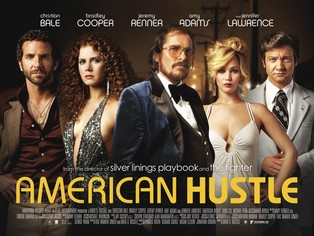
Here Robbie and Paul battle it out. Are you For or Against American Hustle?
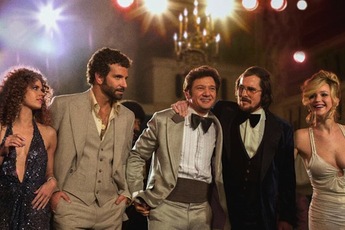
It is an amazing feeling, for a film to be exactly as good as the trailer promised. When I first saw the trailer for this star studded crime film, I was obsessed with it. Too excited for words. I watched it practically every day and the January release seemed too far. Finally the day came when I sat in that cinema and awaited greatness. And you know what?
It was everything I could’ve wanted.
David O’Russell’s American Hustle (because rhyming is awesome) stars Christian Bale as Irvin Rosenfeld, a con artist who works as an informant for FBI agent Richie Dimaso (Bradley Cooper) alongside his girlfriend Sydney (Amy Adams) to incriminate Carmine Polito (Jeremy Renner), the corrupted mayor Camden, whilst trying to deal with stress at home from his ex-wife Rosaline (Jennifer Lawrence).
David O’Russell has proved several times before how wonderful of a film maker he is. From gritty biopic The Fighter to the heart warming Silver Linings Playbook, he knows how to entertain. And that’s exactly what American Hustle does. It’s not one of the best films ever made, it wasn’t trying to be. It didn’t win any Oscars, and it didn’t need to. It’s fun. It’s energetic. It’s utterly enjoyable. It’s not a masterpiece but it’s everything that it had to be and it paid off so well. It doesn’t try to be something it’s not, most notably a true story movie. The film opens with “some of this stuff happened”, and to be honest, they should paste that at the start of every film that claims to be based on a true story. Whilst certain aspects are accurate, American Hustle does not advertise itself as based on a true story and rightfully so. Rather ironic that a redeeming quality of a film about con artists is it’s honesty.
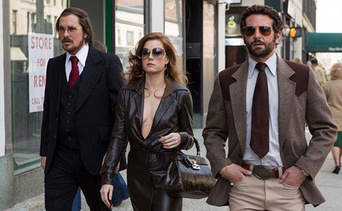
But, the real star of this film is obviously Hollywood’s sweetheart, Jennifer Lawrence, playing Bale’s bitter ex-wife. This is her second collaboration with O’Russell, with the first winning her an Oscar last year. The amazing thing about Lawrence is that you can watch a film with her in, and think “she was brilliant, there is no way she can get any better than that” but low and behold, she does it. She somehow keeps getting better. In American Hustle, she is fierce, crazy and quite frankly hilarious. Whether she was snogging Amy Adams in the toilets or strutting around the house to James Bond songs, she was out of control and undeniably enjoyable.
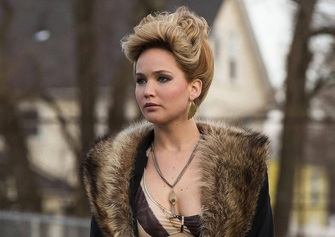
Love it or loathe it, American Hustle did what it set out to do: Be the most entertaining film it could possibly be. It’s not 12 Years a Slave or Dallas Buyer’s Club or Gravity, but that might just be its best quality.
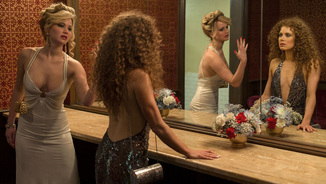
American Hustle was the first new film I saw in 2014. That night at the cinema, a prior engagement and the available showing times really only gave me time for one film, and I had boiled it down to a choice of three: The Secret Life of Walter Mitty, All is Lost, or American Hustle. Numerous factors played in my head to try and help me make my choice, such as running time, appeal, curiosity, and general opinion. With time ticking away, I made a choice that would kick of my year’s cinematic viewing. And whilst I won’t say I’m angry that I saw American Hustle, I am angry that it was my first new movie of 2014.
The problem with American Hustle, in as glib a manner as I can put it, is that it is not a film. Now, obviously I’m opening up a can of worms by making that statement because, frankly, who am I to be making assertions as to what does and does not constitute a film? Cinema is an art form littered with artists who experiment with every aspect of the medium in an attempt to identify just what the definition of a film is. It is a multi-faceted method of telling stories, conveying mood, exploring characters and maybe, just maybe, investigating some truths about who and what we are.
Now, if we take that fairly broad definition as the standard we use to measure what is and is not a film, I submit that American Hustle fails to live up to that standard. I say that American Hustle is not a film. It’s certainly not above definition, though. In fact, there are a few things I would more readily define it as.
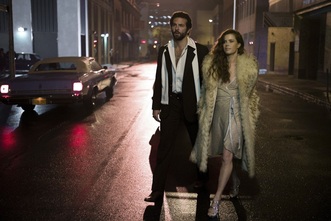
Both of the times I saw American Hustle, I was struck by the obvious notion that David O. Russell was trying to make a 1970s film in the modern era. Now, that’s no kind of shock since a lot of filmmakers try to do that (Captain America 2 also tried to capture something of that era just recently). However, Russell seemed to take that desire further than most, to the point where he wanted everyone to pretend to be people from that era. He didn’t want to be David O. Russell making a movie set in 1978; he wanted to be Martin Scorsese making a movie in 1978. He didn’t want a movie with a fantasy cast of today’s hottest actors; he wanted a movie with a fantasy cast of the hottest actors of the 1970s (Christian Bale is Burt Reynolds, Amy Adams is Catherine Deneuve, Jennifer Lawrence is Faye Dunaway, Bradley Cooper is James Caan, Alessandro Nivola is Christopher Walken… hell, he actually got Robert De Niro and Anthony Zerbe in there!). All of this could actually have made for a very interesting experiment in exploring artistic and cinematic identity, but that’s not what we got in this. What we got was a self-indulgent fantasist gathering up a bunch of his friends and running riot through the wig and costume department, like children playing dress up, all under the pretence of making a movie.
American Hustle is not a film… it’s rough notes passed off as a novel.
The original script for American Hustle was originally titled 'American Bullshit', written by Eric Warren Singer, and wound up on the 2010 Black List of the best unproduced screenplays in Hollywood. When Russell signed on to direct, he also rewrote much of the script, but most specifically the characters. When it came to filming, he then allowed his actors to improvise as much as they wanted, up to and including whole scenes. The further the film went on, the less structured and more aimless it became. Previous efforts of The Fighter and Silver Linings Playbook have a simple and classic story at their core, which is what made them work, or at least be far more agreeable. American Hustle cannot claim this same simplicity. It shoots for complexity, but thanks to its lack of actual structure, it just comes off as meandering nonsense. Supposedly, when Bale said to Russell of all of this improvising, “You realise that this is going to change the plot greatly down track.” Russell replied, “Christian, I hate plots. I am all about characters, that’s it.” I don’t know for sure if that’s true, but if it is, it would certainly explain a hell of a lot.
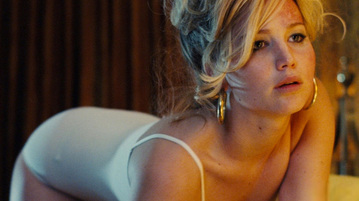
I will say this for American Hustle: I really like all of the performances. Honestly, for me, everyone in the film ranges from very good (Cooper and Renner) to excellent (Bale), from fever pitch (Lawrence) to totally grounded (Adams). However, all of this liking is undercut by Russell’s seeming apparent lack of participation in the process. It’s no surprise that he can get such incredible names for his films, because part of his method is to just let his cast off the leash, to improvise and embellish where they want. Why wouldn’t actors want this kind of freedom? With Russell, these actors get to explore their range. And that’s part of the problem: Russell doesn’t seem to have directed anyone here. He has a talented cast that have been set adrift, and it’s up to them where they end up. All Russell has done is aim a camera at it. He hasn’t even tried to convincingly create the world around the characters to complete the illusion, so it all just comes off as flat. There is just no atmosphere, no texture, no grit to it that would give it the mood of a 1970s film. Russell is riding the coattails of his cast and that is simply no good enough.
(Oh, and Jennifer Lawrence is about a decade too young for her role. She’s great, but she’s utterly miscast.)
American Hustle is not a film… it’s a con.
I would love to say that all of this is, in actuality, the entire point of American Hustle. That it is a film about a con that plays with notions of authenticity, perception, misdirection and sleight-of-hand narrative trickery, and that it uses all of these to make a point about the flimsiness of what we see and what we choose to believe. I would love to say that American Hustle was clever enough to make an intentionally sub-par film in order to make some sort of comment on how susceptible we are as a society to being conned, so long as it’s good looking and charismatic players that do it, thereby making the whole thing one giant meta-con. But it isn’t. This idea is supported by nothing other than a bewildered viewer desperately clambering to find a reason as to why American Hustle would receive awards and plaudits that it so patently does not deserve. Best Picture? Best Director? Best Screenplay? Give me a goddamn break.
Ultimately, my point comes down to this: American Hustle does not tell a good or coherent story; for all of the hair and clothes and music, it captures nothing of the tone or mood of the period in which it is set; it only mildly explores characters, but still suffers from constantly changing direction; and it unveils nothing about who or what we are as human beings. American Hustle is a mess, barely written or directed, punctuated only by good performances and the gaudiest of window dressing.
But it is not a film.

 RSS Feed
RSS Feed
